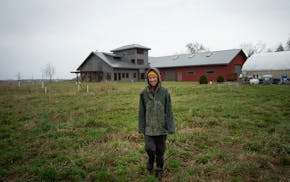From its innovation labs around the world, 3M Co. has emerged as an unsung hero behind the Olympic athletes who barrel down ice chutes at 90 miles per hour with the hope of winning gold.
The Maplewood-based conglomerate, known best for its Post-it notes, sandpaper and adhesives, has created specialty abrasives that polish the blades for the Olympic bobsled and skeleton teams from Great Britain, Canada and the United States. Discrete groups of 3M scientists from their respective countries have worked separately with each Olympic team, creating custom polishing tools — which work like sandpaper — to give the bobsled and skeleton blades maximum speed.
To be involved in the Olympics creates "a tremendous amount of satisfaction and reward," said Rich Crowley, a 3M engineer who works with the U.S. bobsledders. "The team really appreciates it. That is visible when we make a donation to the bobsled team and the skeleton team."
The 3M scientists root for their respective teams and do not share approaches, company officials said. 3M joins BAE Systems, BMW, PodiumWear and a long line of global companies that quietly donate resources to help athletes during the Olympics.
Some of 3M's partnerships, such as the one with the British bobsled team, date back two decades. A British 3M technical specialist, Nigel Willcock, has been helping the bobsled team maximize blade speed with specialty abrasives. Meanwhile, 3M Canada has donated industrial abrasives for that nation's team.
And in the past few years, 3M's Maplewood headquarters has been giving the U.S. bobsled team an assist, even helping the bobsledders overcome a recent problem. The governing body of the USA Bobsled and Skeleton Federation mandated that all U.S. competitors use blades all made out of the same type of steel alloy. The teams had to machine the blades and then find a way to grind and polish away all the tiny burrs, swirls and marks that can slow a bobsled's speed. The smoother the blade, the faster the sled. The athletes polish each blade by hand.
"This was a new stainless steel alloy and different from what [the team] was using in the past. So they were concerned," Crowley said. " 'How do we finish this? How do we polish it [for speed]?' They had no familiarity or history with it."
Mike Dion, head coach for the U.S. Olympic bobsled team, turned to 3M for help. If anyone knew polishing, it was 3M. The company began making industrial abrasives in St. Paul more than 100 years ago and now has plants around the world.
Dion flew to Maplewood several times and visited Crowley's team in their abrasives lab.
They ordered and tested different sizes and types of abrasives from 3M factories around the globe. The engineers then crafted a specific type of abrasive "sequence," ranging from coarse to micro, until they had the exact formula that responded perfectly to the new metal alloy.
It took "days to identify the sequence that was going to work. And then there was testing," Crowley said. "We leveraged a lot of know-how from 3M people who came before me. So a tremendous asset went into helping the bobsled team solve the problem."
3M's new high-tech sandpaper had to have the right grit and the right backing to work at the Olympics. It had to fit in an athlete's hand and be sturdy enough to grind steel to a pearl finish without falling apart. And it had to pass the strict inspection of the governing body for the U.S. Bobsled and Skeleton Federation.
In the end, a durable microfinishing film was selected that came from 3M's plant in Cumberland, Wis.
As the Olympics draw to a close, what are the results?
This week, the two-woman Canadian bobsled team won gold. On Wednesday, two of the U.S. two-women bobsled teams finished with silver and bronze medals and made history as the first-time women bobsledders who claimed two medals at the Olympics.
On Monday, the two-man U.S. bobsled team won bronze, becoming the first U.S. medalists in that category since 1952. Canada's team placed fourth and sixth, and Britain finished 23rd.
In the skeleton competitions, Britain's Lizzie Yarnold won gold for the women. Meanwhile, Kristan Bromley placed eighth and Dom Parson placed 10th for the men. For the U.S. skeleton competition, Noelle Pikus-Pace won silver for the women and Matt Antoine of Prairie du Chien, Wis. won bronze for the men.
Dee DePass • 612-673-7725

